Jose Marroquin Galan couldn’t get to the top of the ferry in Portland fast enough.
Wearing a black puffy coat and a smile so wide the space behind his molars showed, he grabbed the railings as far up as his 12-year-old arms could reach and launched himself up each stair.
Jose didn’t look like a boy who was half a day away from having his chest cut open and his heart sewn up in an operation that would, at once, threaten and save his life.
He did look like a boy who had never been on a boat before.
A few days earlier, he and his mother, Rina Galan, had taken their first plane ride.
“Primero y ultimo,” Galan said with a nervous laugh. First and last.
In her 40 years, Galan had never left El Salvador. If her only child hadn’t been born with a life-threatening heart defect that surgeons there didn’t have the training to fix, she never would have left.
Jose was different; he wanted to travel. His father, whom he sees on weekends when they play ping-pong and go to Pizza Hut, has a friend who lives in Utah. Jose wants to visit her and his aunt in Toronto.
He liked it in America, from what he could tell by staying at the Ronald McDonald House on Brackett Street. The food was good, the showers were warm and his clothes smelled nice when they came out of the laundry machine, something no one they know has in El Salvador.
But, mostly, he was happy to be there because he would have the operation and, after that, he wouldn’t have to worry anymore.
Jose was 3 months old when, during a routine checkup, a doctor heard what sounded like a whisper when his heart beat. That revealed he was born with a ventricular septal defect — a hole in the wall between the lower chambers of his heart. Without repair, it would eventually cause heart failure.
Outwardly, he has never shown signs of the condition. Still, his mother made sure he knew, if he was ever playing soccer or riding his bicycle and something felt wrong, he had to stop. He also knew that, as he got older, it would get worse.
Galan submitted his medical records in December to Gift of Life International, a Rotary-affiliated program that connects children with congenital heart defects to hospitals that will fix them for free.
Between her job working the teleprompter at a TV station in San Salvador and her ex-husband’s salary as an accountant, they had no way of paying for the operation themselves.
Galan thought it would be years before they heard back from Gift of Life. But, in March, she was told to get passports for her and Jose. Three months later, a surgery date was set for September. Talking about it, Galan could cry. She remembers being happy that Jose would have the operation, but sad to have to leave her family and scared to go alone.
Galan and Jose flew out of San Salvador on the morning of Sept. 15 and arrived in the Dallas airport at midday. Once Galan found the gate for their flight to Boston, she sat down in a chair and didn’t move until the plane boarded three hours later.
Galan knew she was meeting a man in Boston, but didn’t know what he looked like. After landing at Logan International Airport, she walked around holding an envelope from Gift of Life so he would recognize her.
Paul Emery, a bear of a man with a trim white beard, had seen pictures of the mother and son on copies of their passports. When he spotted them, he opened his arms.
“Bienvenidos a los Estados Unidos,” he said in a booming voice that would weave in and out of self-taught Spanish whenever he was with them.
Emery, a member of the Westbrook-Gorham Rotary Club, became the Maine ambassador for Gift of Life after hearing a talk at a Rotary convention in New Hampshire given by the organization’s first recipient. Grace Agwaru, a Ugandan woman, received life-saving heart surgery as a child in 1975, when a Rotary club in her country connected to another in Long Island, N.Y., where she had the operation.
Since then, more than 15,000 children from 68 countries have had heart surgeries arranged through the program.
Emery made arrangements for operations last May for two young Dominican girls, the first Gift of Life patients to come to Maine. He also acted as the driver and tour guide for the babies and their mothers and did the same for Galan and Jose.
He brought them to a doctor’s appointment in Scarborough and a Rotary meeting in Westbrook. They went to Becky’s Diner, where Jose was impressed by the size of the pancakes, and to Gilbert’s Chowder House, where he cracked his first lobster and ate the whole thing.
Emery also introduced them to Ana Alvarez, a Portland woman from El Salvador whom he met through an employee at the Red Cross on Forest Avenue, where he donates platelets.
Alvarez grew up in La Union, a port city on the eastern coast of El Salvador, across the country from Galan and Jose’s home in Izalco. She was studying to be a nurse in the early 1990s, near the end of the Salvadoran civil war, when she decided to leave college and the country to escape the fighting.
In Boston, she met her husband, Saul Alvarez, who was also from El Salvador. After visiting her sister in Maine, they decided to move here themselves.
Galan didn’t expect to meet anyone from El Salvador in Portland. The day after they arrived, Jose was in the living room at the Alvarez home on Park Avenue playing video games with Ana’s sons, Felipe, who is his age, and Andrew, a freshman at Deering High School.
Their sister, 17-year-old Jessica, drove Galan and Jose to Walmart to buy winter coats and a cellphone. Saul Alvarez’s sister fed them pupusas — stuffed tortillas that are a Salvadoran staple — at Tu Casa, her restaurant on Washington Avenue.
The day before the operation, Ana Alvarez took them on the ferry to Peaks Island — the first boat ride for both Jose and Galan — and, after that, to her older son’s soccer game, just in time to see the very end. Jose shouted at the team from the sidelines to play harder. It’s a much rougher sport in El Salvador. Jose worried he wouldn’t be able to play after the surgery.
The next morning, three members of the Alvarez family sat in a waiting room at Maine Medical Center just after 6 a.m., as the hospital staff got Jose ready for his operation.
Galan had been upset the day before, Ana Alvarez said; she didn’t sleep all night.
Jose was on a hospital bed, wrapped in white sheets and holding a small bear, when the Alvarezes were allowed into the pre-operation room. As Ana Alvarez bent over the boy, Galan stood back, her face red from holding in tears.
Alvarez knew Jose’s birthday was coming up soon. Now was the time to make a big list, she told him. She asked if three PlayStations would be too many. No, he said smiling, because if one broke he’d have backups.
Jose came in and out of sleep, his eyelids falling and his head cocking to the right, as hospital staff rotated through the room. He rubbed his eyes awake just before the doctor came in.
Reed Quinn is the state’s only pediatric heart surgeon and has a reputation for not saying no to foreign children in need — patients that few U.S. hospitals have been willing to take lately, said Rob Raylman, executive director of Gift of Life International.
Galan and Jose already had their tickets to Boston and the promise of an operation when Emery asked Quinn in August if he would do it.
Quinn rested his arm on the back of Jose’s bed, leaned over and asked how he was feeling, though he knew it meant nothing to the boy. Jose told an interpreter from the hospital that he was happy to be having the surgery.
Quinn asked Galan to stand with him at the foot of the bed. He drew a picture of a heart and explained, through the interpreter, what was wrong with Jose and how he would fix it.
The hole in his septum had also caused damage to his heart’s valve. Quinn said he would close the hole and try to fix the valve with Jose’s own tissue. If he couldn’t, he’d put in a mechanical valve, which would mean Jose would have to take a blood thinner for the rest of his life.
He laid out the risks of the operation: bleeding, infection, possible stroke, injuries to the organs or nerves. Lastly, he said, there was a 2 percent chance Jose wouldn’t survive the surgery.
Were there any questions, Quinn asked. Galan shook her head. Jose was asleep.
Galan walked alongside her son’s bed as he was rolled away to the anesthesiologist. Minutes later, she stumbled back into the room with her hand over her face, gasping for air. She wouldn’t see him again until it was over.
The surgery was supposed to take four hours. But that passed, then five hours, then six. Galan had heard nothing.
The hospital’s interpreter, George Bentley, asked a nurse what was causing the delay. She said she wouldn’t be able to say until the doctor came out, which should happen shortly.
What they didn’t know was that, while Quinn was fixing Jose’s heart, he found an aneurysm in the junction of the aorta and the heart — another complication caused by his condition that, if untreated, could lead to a stroke.
Bentley had to leave for another appointment, but assured Galan another interpreter was on the way.
Before she arrived, Quinn came out into the waiting room. There was a big smile on his face, Galan said, and that was all she needed.
Galan only got to see Jose for a few minutes that afternoon. Under the effects of the anesthesia and a tranquilizer, he looked like she’d never seen him before. His eyes were rolling into the back of his head and his neck was loose. He lifted his arms up from his sides, she said. She thinks he was trying to hug her.
Galan slept at the Alvarez’s house that night. Three times she woke with a start and thoughts of her son. She slept on a couch in his room after that.
Jose moved from the intensive care unit to a room on the sixth floor in the Barbara Bush Children’s Hospital on Tuesday. By Wednesday, his blood counts had risen to normal levels.
That afternoon he sat in a hospital gown thumbing the controller of the Nintendo 64, his favorite pastime. I feel like it’s me in the game, he said.
Galan was on her cellphone when two of Saul Alvarez’s sisters came into the hospital playroom. My second family is here, she said into the receiver.
Later, she opened her phone and showed the list of contacts.
“Alvarez, Alvarez, Alvarez,” she said. There were probably 10 of them in there.
Other Salvadorans living in the area had heard about Jose’s surgery and came to the hospital to visit. They were nice, Galan said, but it wasn’t the same.
Galan and Jose had planned to go back to the Ronald McDonald House when Jose was discharged, but Ana Alvarez offered for them to stay with her. They couldn’t pass up the warmth of family, Galan said.
Jose was cleared to leave the hospital Wednesday, but he was still complaining of pain, so they kept him one more night. It was hard for him to breathe and even harder to walk. Then, there was the constant ticking coming from his chest. It sounds like a clock, he said, sticking a finger in each ear to block the noise.
Galan and Nicole Mizner, a nurse practitioner who specializes in cardiology, stood on either side of the bed in Jose’s hospital room Thursday morning, as he slept. Bentley, the interpreter, was at the foot.
Mizner explained that Quinn had to put in a mechanical valve, so Jose would stay on the drug Coumadin while he was here and then whatever blood thinner was available in El Salvador. In about a week, he would see a doctor, who would decide if he was ready to go home.
Were there any types of food he should be eating to help him heal, Galan asked Mizner. Just a regular, healthy diet, she said.
What should she do to clean his wounds? Galan asked. Mizner said he could shower, but no baths and no swimming. Galan laughed; Jose didn’t know how to swim.
She asked if he could dance at his birthday party Saturday. Yes, Mizner said, but no contact sports.
Jose would always have to be careful with his heart.
Galan laughed. So, she said, no falling in love.
Staff Writer Leslie Bridgers can be contacted at: 791-6364 or at:
lbridgers@pressherald.com
Send questions/comments to the editors.


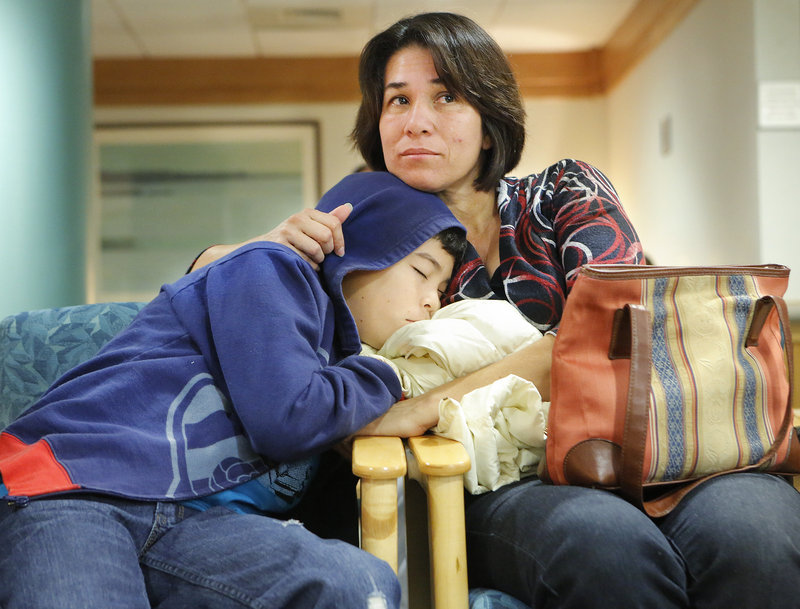
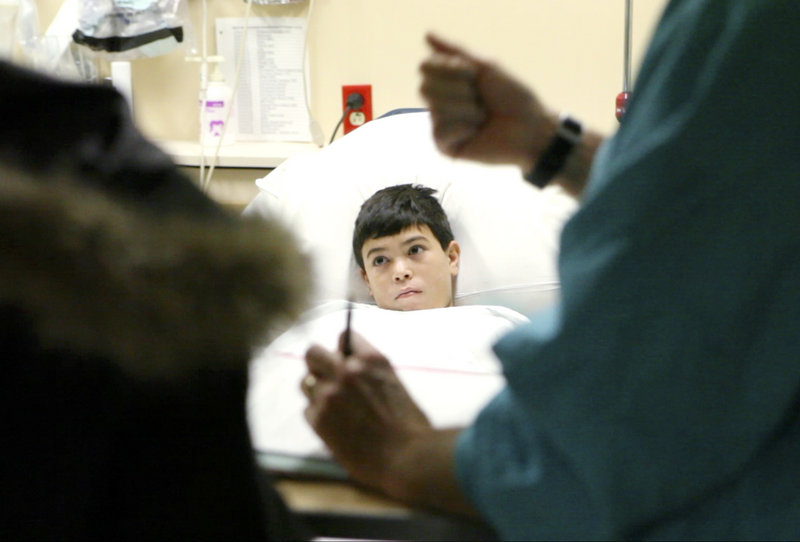
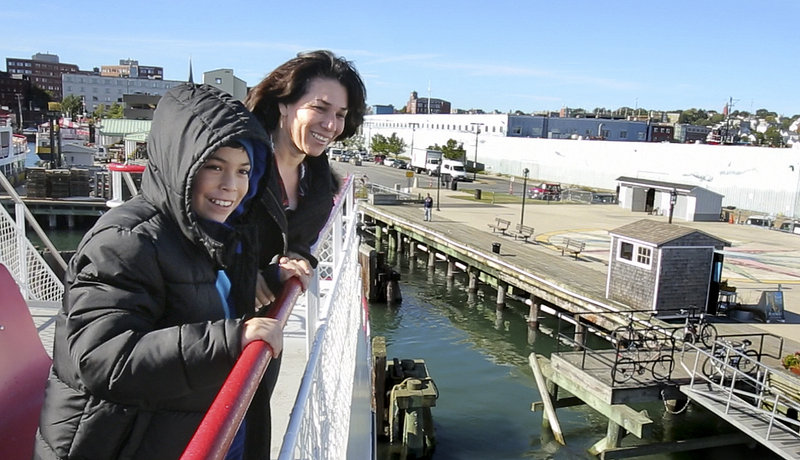
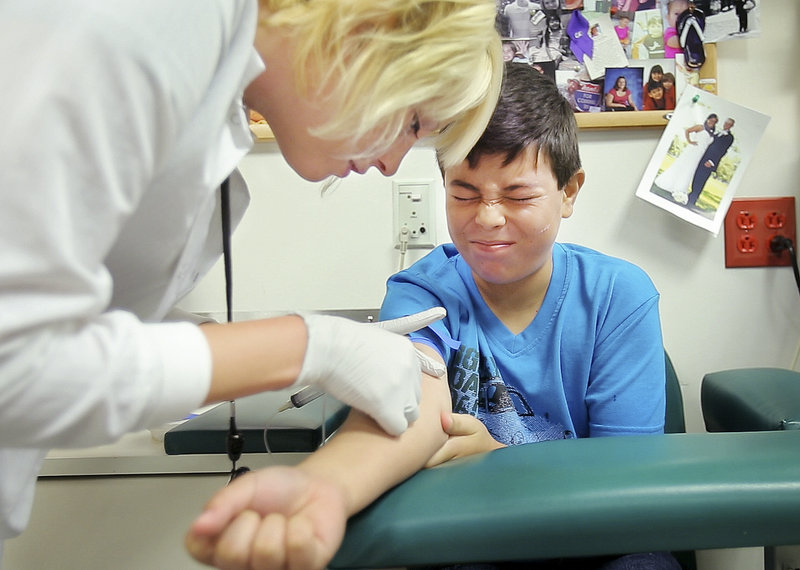
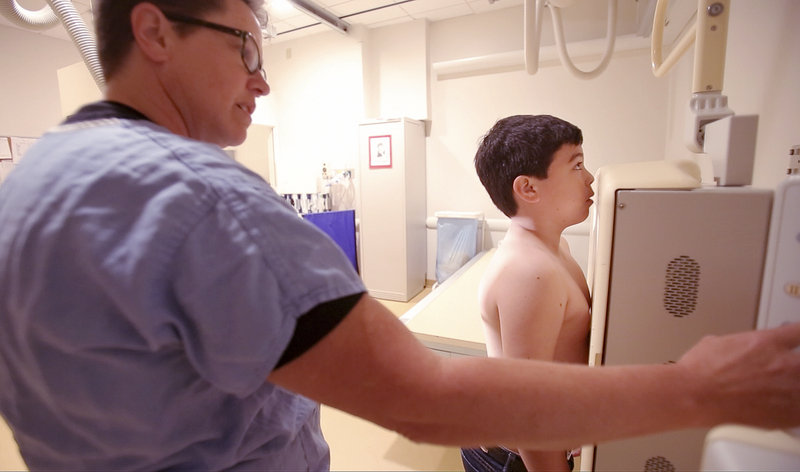
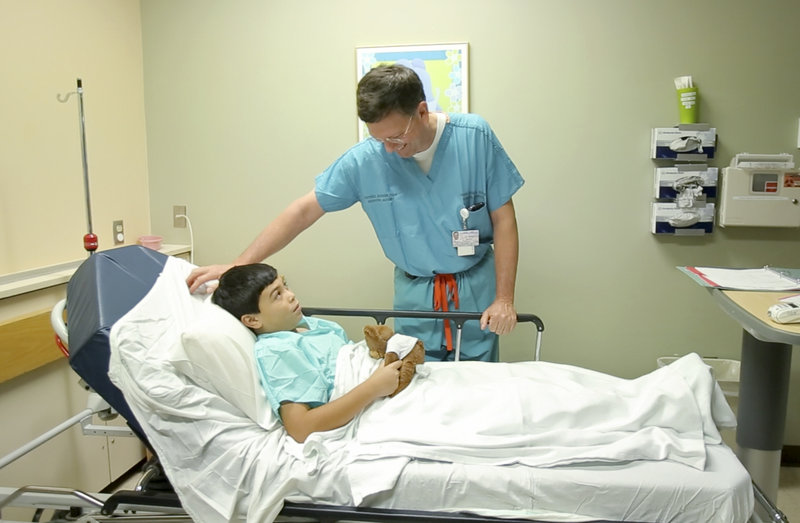
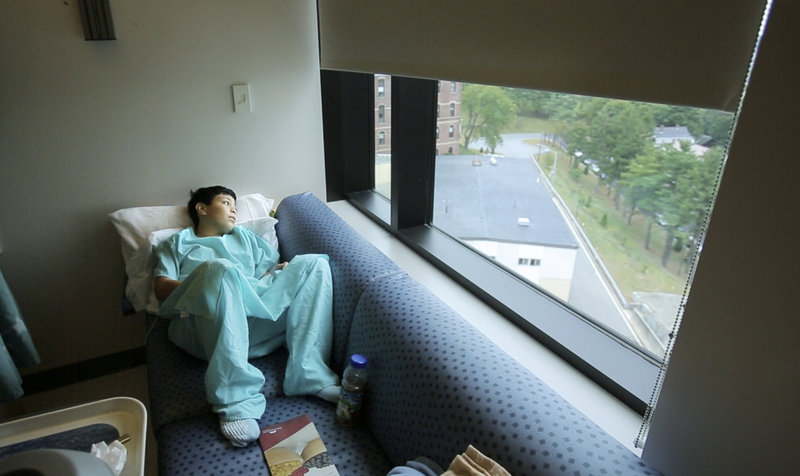
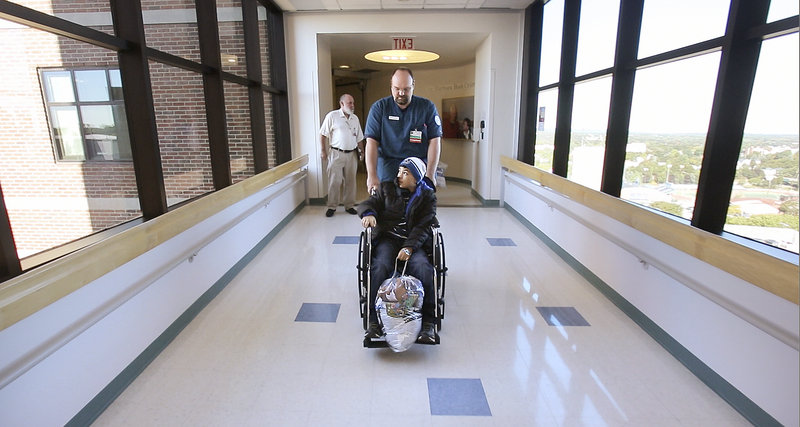
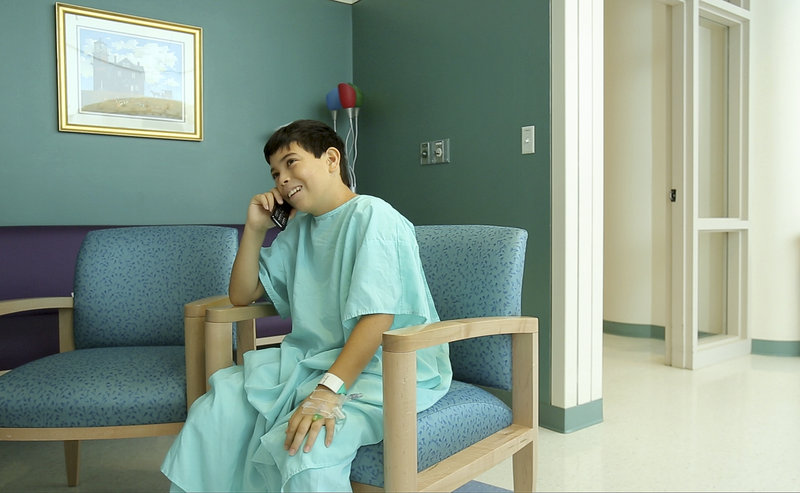

Success. Please wait for the page to reload. If the page does not reload within 5 seconds, please refresh the page.
Enter your email and password to access comments.
Hi, to comment on stories you must . This profile is in addition to your subscription and website login.
Already have a commenting profile? .
Invalid username/password.
Please check your email to confirm and complete your registration.
Only subscribers are eligible to post comments. Please subscribe or login first for digital access. Here’s why.
Use the form below to reset your password. When you've submitted your account email, we will send an email with a reset code.